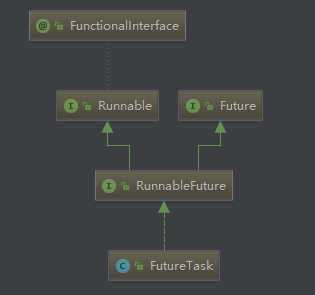线程的三种实现方法
Posted yufeng218
tags:
篇首语:本文由小常识网(cha138.com)小编为大家整理,主要介绍了线程的三种实现方法相关的知识,希望对你有一定的参考价值。
线程的三种实现方法:
(1)继承 Thread 类,重写run()方法;
(2)实现 Runnable 接口,重写run() 方法;
(3)实现 Callable 接口,重写call()方法;
方式一: 继承Thread类
public class MyThreadDemo
{
public static void main(String[] args)
{
Thread thread = new MyThread();
thread.start();
}
}
class MyThread extends Thread
{
@Override
public void run()
{
System.out.println("extends Thread");
}
}
方式二: 实现 Runnable 接口
public class MyRunnableDemo
{
public static void main(String[] args)
{
//方法一
Thread thread = new Thread(new MyRunnable());
thread.start(); //启动线程
//方法二 匿名类
Thread thread1 = new Thread(new Runnable()
{
@Override
public void run()
{
System.out.println("anonymous class implement Runnable");
}
});
thread1.start(); //启动线程
}
}
class MyRunnable implements Runnable
{
@Override
public void run()
{
System.out.println("implement Runnable");
}
}
方式三: 实现 Callable 接口
Callable 的 call() 方法会返回执行结果,抛出异常;
ExecutorService :线程池的接口;
Executors: 线程池的工具类
public class MyCallableDemo
{
public static void main(String[] args) throws ExecutionException, InterruptedException
{
//方法一 使用线程池方式
ExecutorService executorService = Executors.newFixedThreadPool(2);
Future future = executorService.submit(new MyCallable());
future.isDone(); //return true,false 无阻塞
System.out.println(future.get()); // return 返回值,阻塞直到该线程运行结束
//方法二
FutureTask futureTask = new FutureTask(new MyCallable());
Thread thread = new Thread(futureTask);
thread.start();
System.out.println(futureTask.get());
}
}
class MyCallable implements Callable
{
@Override
public String call() throws Exception
{
System.out.println(Thread.currentThread().getName() + ": 执行 Call 方法");
return Thread.currentThread().getName() + "线程运行完成";
}
}
运行结果:

FutureTask 类实现了 Runnable 接口

以上是关于线程的三种实现方法的主要内容,如果未能解决你的问题,请参考以下文章